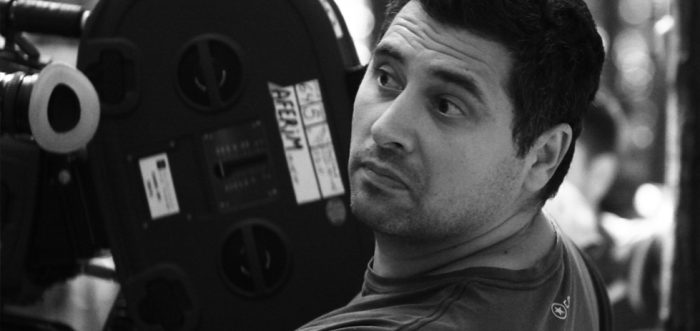In recent years, Radu Jude has established himself as one of the most consistent, original, and thought-provoking directors working today, whilst distinguishing himself amongst the few concerned with continuing a certain dialogue with the history of the form. From his early string of driven short films, extensive work in TV commercials1, to theatre works, Jude’s talents haven’t been constrained to the filmic medium alone. That said, his recent string of features – from 2012’s Everybody in Our Family, 2015’s Aferim! to his latest release Scarred Hearts – has seen Jude build a body of work that is defined by its passion for history, film, and the relationship the two share. As both a leading figure of Romanian New Wave, and as one of the 21st century’s most captivating filmmakers it was a pleasure to catch up with Jude at Locarno Film Festival to discuss his latest film, Scarred Hearts – which focuses on the short, tragic, yet ultimately inspiring life of the Romanian author Max Blecher.
I wanted to start by mentioning that when Aferim! came to Australia, our reviewer who saw the film gave it the highest rating that we have on the site. For me, it was also amongst my favourite films of last year. I was thinking about this before going into Scarred Hearts and when I felt a certain gravity hit me regarding the film – that it’s premiering a year after your previous work; that within a year you’ve turned over a two-and-a-half hour film, one that has been one of my favourite films in the competition so far. I wanted to know, I guess, whether it’s actually been a year – or if this is a movie you were making concurrently to your previous work?
Well, they were developed… the two films… more or less at the same time. The screenplay for this one was written four years ago, actually. The reason I did this was that for Aferim! I had some problems with financing, and I wrote this project in-between. Finally we succeeded to get the money for it, and to make it – that’s one thing. On the other hand, I don’t think it’s that fast. It is how you compare it… If you think of the classical cinema, I think John Ford was making a film every year, or something like that. In my case I discovered that if I wait long a long time, because I’m not very talented nothing happens; if I wait more, it doesn’t get better. I even directed a play in-between, at the same time.
You mentioned this classical period, which I feel is reflected very heavily in terms of the form you’ve used for Scarred Hearts – using the academy ratio, maintaining the 35mm film, as well as the approaches to editing and colour grading the work. I remember before the film, Carlo Chatrian (director of Locarno Film Festival) reflected that your work “reminds us that cinema has a shape” –
It’s very simple: on one hand, I wanted to go back to this classical type of filmmaking with the film academy ratio. On the other hand, because the main character is always lying down, the obvious choice would be to go with a wide frame and cinema scope – and I wanted to go against what’s obvious. I thought that maybe… and also to give a vertical space above them, that it could be a symbolical interpretation of that, but I don’t know. I wanted them to have space.
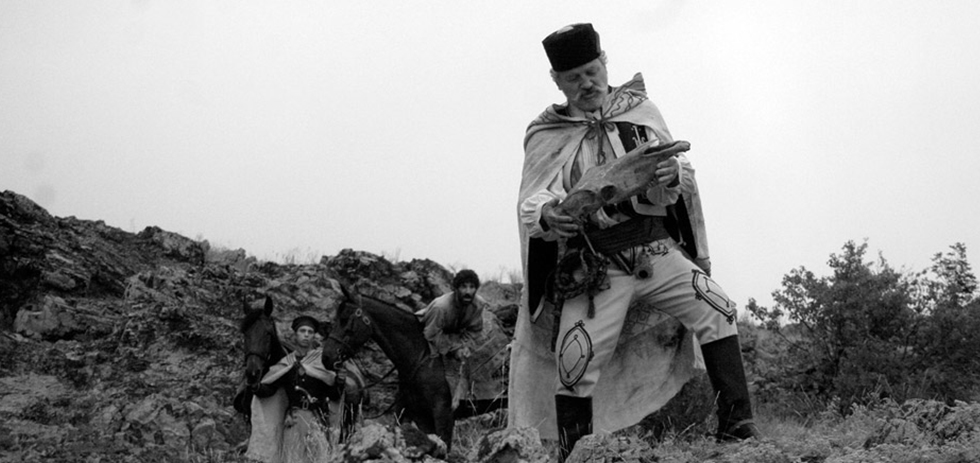
I was interested in how you feel your own approach to thinking how you want your films to look, has developed from you first film in 2012. I feel like your style has become more pronounced since, and including Aferim!, especially in the sense that it’s very distinguished… that there isn’t many films in the competition that look like it. Is it something you’ve been conscious about, or more a development in of itself?
It’s nothing that I’m conscious about. I try to make things that please me. There are some ideas behind the choices but they do not come from searching to be different, original or something like that, I am not able to do that.
Do you think maybe that your influences have shifted much in this time? I was re-watching one of your older shorts from 2006, The Tube with a Hat, I think that’s the English name. I thought it was still visually distinct thing in a less reflective way—where it felt like they were different influences and less dialogue with the history of the genre—than there is in a film like Scarred Hearts. I wanted to know whether you felt like your view of cinema has changed in the last 11 years or something?
Yes, totally. But that short film you mentioned… it’s a very naïve film. It’s a film that’s naïve because I was so unexperienced and I somehow believed in the possibilities of cinema to represent reality. I do not believe this anymore, I’m interested more in the cinema like [a] mind-game… so to speak; not a representation of life, but a presentation of what somebody thinks about some aspects of life. What changed is that I lost confidence in the power of having a connection with reality.
On that whole “mind game” aspect of cinema, you found quite a perfect subject to make a film about this idea with Max Blecher, I feel. I’ve been thinking about his work, and I wanted to know if it was prominent and widely known in Romania or if he was still a fairly unknown figure?
No, he was an author that was not really talked about when he published his books in the ’30s, because he died very young; immediately after publishing the books. Then the communist regime didn’t publish his books and he was discovered in Romania only in the last 20 years. Apart from people in the literary milieu, he’s not a popular writer, although I think he has the potential to become a popular writer, and I would really like to make the people, especially the Romanians… he’s a very particular and special writer and has a certain kind of sensitivity which is not common.
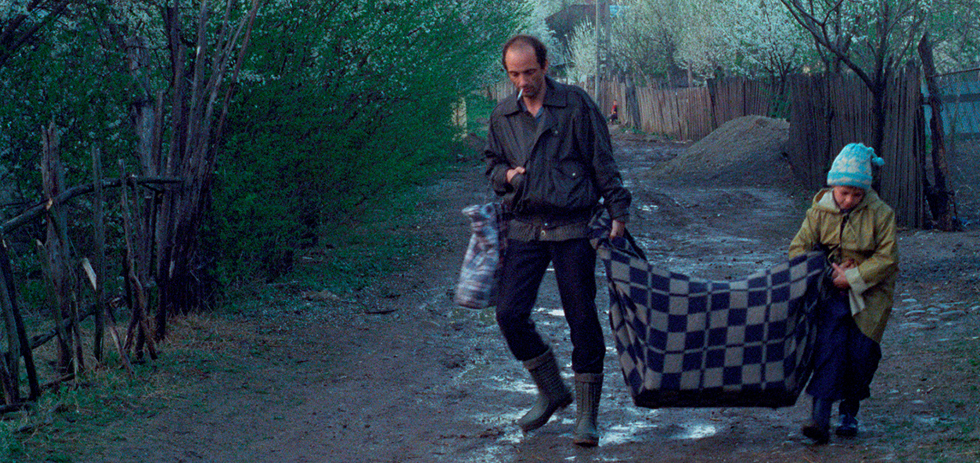
How did you approach choosing which parts of his story to map out on screen?
That was a tough decision, and to be honest now, if I would do the film again, I would choose some other things. I wouldn’t change at all the film, but I would change some other stuff. I think I did it according to the pace of the moment and the film has a fragmentary nature that reflects this. It’s some fragments taken from some of this book, but also the fragments that I invented to collect episodes between them. I’m not sure I left out things that, in my opinion, were becoming too obsolete. Some of the things in the books are largely autobiographical, but there is one big episode in the book which is obviously an invention of Blecher: I took it out because it felt so fake.
There’s quite a bit of political context at the time, and you definitely show this in the film: some of the conversations where he was arguing with some people sympathising with Germany’s move towards fascism. I thought the scenes where we’d watch Blecher arguing against anti-semitic ideology, gave a lot of context to the film. Did you take much of this from the author’s life or –
The author’s life?
The author’s life and also his writing too.
No. These are things which are not in his writings, actually, but it is written about. Then he died immediately, just in the moment when Romania was becoming a total fascist and Nazi state. I didn’t want to shy away from this aspect because for me it was very painful and important to see my country, the history of my country with this strong connection with anti-Semitism and the Nazi. You know Romania is very typical, Romania is the second country after Germany regarding the number of Jews which were killed. Romania killed 400,000 Jews, Romanians. This is something which people do not like to talk about in Romania, and I belong to the Romanian community and I feel somehow not guilty, because it’s not my fault of course, but I feel responsible to bring it to light. I wanted to include this part in the film because my reading of Blecher is from the present to the past. I think it’s justified to see it in this light.
Yeah, for the record, I think it works really well in creating that broader atmosphere – especially in relation to Blecher’s own frustration. In the way in which it’s introduced as he’s becoming more closed in. In that movement over the course of the film, moving from the start where he’s bit quirky, a bit optimistic entering the sanatorium; then after about 40 minutes it felt like it really started to become much darker, assisted a lot by your use of a still camera. You started to feel how trapped Blecher was starting to feel in that shooting style; the claustrophobia bled through a lot, and I thought that worked really well. How you did you think this out establishing this sort of teleology?
Yes of course, this is regarding the storytelling part? Otherwise, it was an idea to play with the convention of cinema. People justify the reasons that the more something moves on the screen, the more cinematic it is. Cinema from a theme-logical point of view is: the images that move, and the things move, the more cinema this is considered. Here, we have a case where the characters move very little… so I said the camera [should] move very little to have an anti-cinema, in a way. To go against the idea that cinema should be moving all the time, that it should be connective. That was the reason for that.
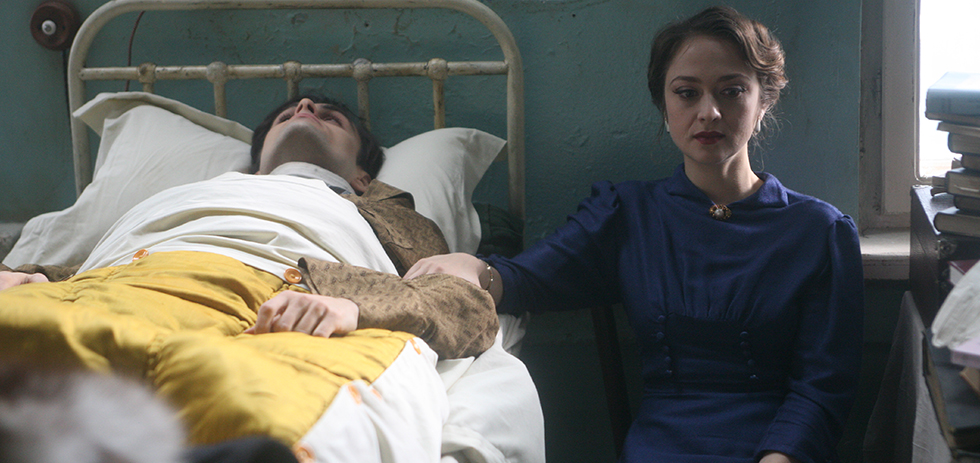
Scarred Hearts is… very loosely, but still can be viewed as a period piece – in the sense that’s it’s depicting a period of time that has passed a long time ago. Did you find it to get these sets, costumes, and everything together? I thought one of the main things that made the film so engrossing was the fact that every shot and every set was very convincing and coherent throughout the film – was it a difficult process to reach this stage?
Yes, but also, we’ve been a bit lucky because we found the sanatorium that goes to the Black Sea and it was empty, a part of it was not used anymore. So we could use this location and organise the sets inside of it. I still don’t know what I would have done without that.
After watching this and Aferim! and you mentioning your comfort with the pace these films have been released, do you feel like feature films are where you will be continuing to operate at this stage? I know you’ve got a long history in shorts, and even commercials, but yeah, I wanted to know if features were where you were most comfortable expressing yourself at the moment.
Yes, [though it’s] not really the plan for [a few] reasons… I’m going to direct probably two more theatre plays this year and the beginning of next year. I’m finishing the editing of a film which is based only on photographs. It’s a private archive of photographs from the 30’s and 40’s which was discovered in Romania. They are glass plate photographs, 7,000 of them, and they made a film out of these photographs – which in the details, you can understand a lot about the Romanian society of that time. It’s a kind of essay or what you call that kind of film… and I don’t know, I will try to stay open whatever will come to my mind.
The theater plays that you’ve been doing are they just within Romania or have they traveled outside?
For the moment only in Romania, it’s difficult and expensive to do theatre but it’s based on… I directed a version of Scenes from a Marriage… Bergman did it first actually…
Right, so he did a film and play, did you change much when you redid his work?
Yeah, I cut some of the things out because it was too long. The show is three hours and it couldn’t be more.
I was looking last night, reading some of your history and noticed that you had worked on one of Costa-Gavras’ early 2000 works –
Amen. 2
Amen, yes! I was wondering whether he was an inspiration or whether that was simply something that came together through working?
It’s a strange thing because I was very young when I started to work as an assistant director, I was the third assistant director actually, and one of the few things I was in was Costa-Gavras’ movie, which was shot in Romania. At that time, it was a very powerful and impressive experience… but I felt somehow not very close to his kind of cinema in that moment? But I admired him a lot, and I respected him and he’s way of dealing with people. He’s a really polite and elegant person, but he didn’t impress me then. But now, when doing these two films which deal with history and Scarred Hearts, I started to remember a lot of things from working with him. I would say that only now there’s an influence.
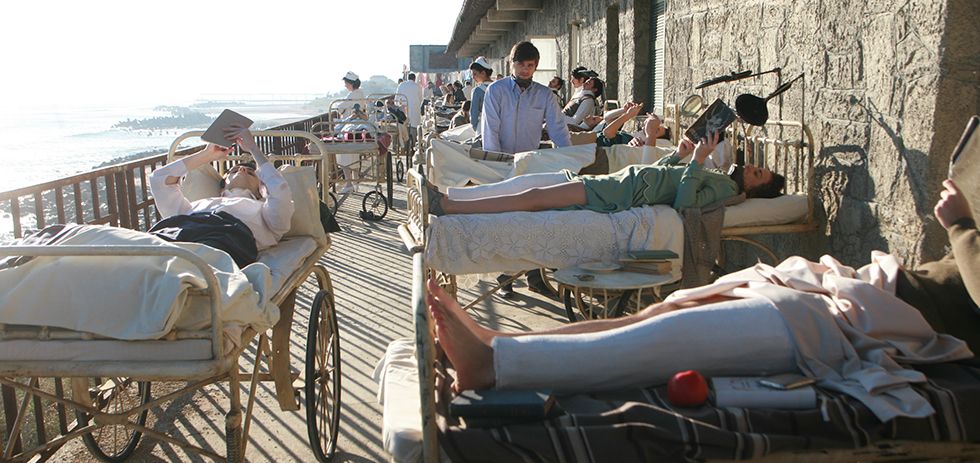
I was interested in how you feel debut or premiering a film in the Concorso Internazionale at Locarno, how you feel it’s been received and how you…
I don’t know, I judge the festivals not how the sales agents would judge a festival, according to how the sales would go. Of course that means something, but not that much. I judge a festival according to what things I’ve seen recently in those festivals. Regarding Locarno, some of favorite films in the last years were here. For this means much more than that.
Definitely. There aren’t too many that have made it too Australia, but between Pedro Costa’s Horse Money, Albert Serra’s The Story of My Death, and Lav Diaz’ From What is Before amongst others, they’ve always been complex films grounded in a belief in cinema, I feel – what has been a highlight for you?
The Hong Sang-soo –
Oh, Right Now, Wrong Then? We had that last year, that was a lot of fun.
There is also a kind of a documentary made of archive material which was here in competition two or three years ago, Pays Barbare by Yervant Gianikian and Angela Ricci Lucchi, you’ll find it on You Tube.3
I’ll make sure to check that out. One of the last things I wanted to ask about was about Romanian cinema more broadly, in that today there seems like there’s quite a lot of momentum, both residually from Romanian New Wave as well as more broadly. I feel like I’ve seen quite a few films out of Romania this year, and quite a few have strong runs in recent years. I know The Treasure got a really good review from our site, for instance. I was curious as to how you feel about film within Romania today, against versus how it’s been in the past?
I really think there are a few talented film makers in Romania, that’s one thing. The other thing was that these film makers could access a little bit easier than 10 years ago public funding from Romania, from European Union, that’s all. I afraid I can’t answer you specifically because I’ve worked so much in the last years that I didn’t see all the Romanian films.
Is it difficult to work with such pace and also keep up to date with watching many films or?
Yes, but if you work every day you get a lot of things accomplished. I’m more interested in working because the process itself it’s really nice, it’s really innovating.
That was my last question but I really enjoyed the film yesterday and found it to be one of the most enjoyable films.
Is it boring?
[laughs]
No, I wouldn’t call it boring at all. I found it was a really physical kind of experience, that really pulled viewers into a particular space – to see that become more tense, more claustrophobic; and to feel those emotions strongly, whilst being so engrossed. I didn’t want to leave the film, but I felt really tense in a sense of empathy with Max Blecher… maybe more sympathy than empathy. But I felt it was very nuanced in how he was depicted. At times I felt a real anger at him, at other times he seemed immature, and at other times he seemed deeply poetic and human. I thought it was one of my favourite films in the competition, and it was very emotionally draining, but I couldn’t call it boring at all; I hope it goes really well in the competition. Thank you very much.
Thank you. Nice to meet you.
